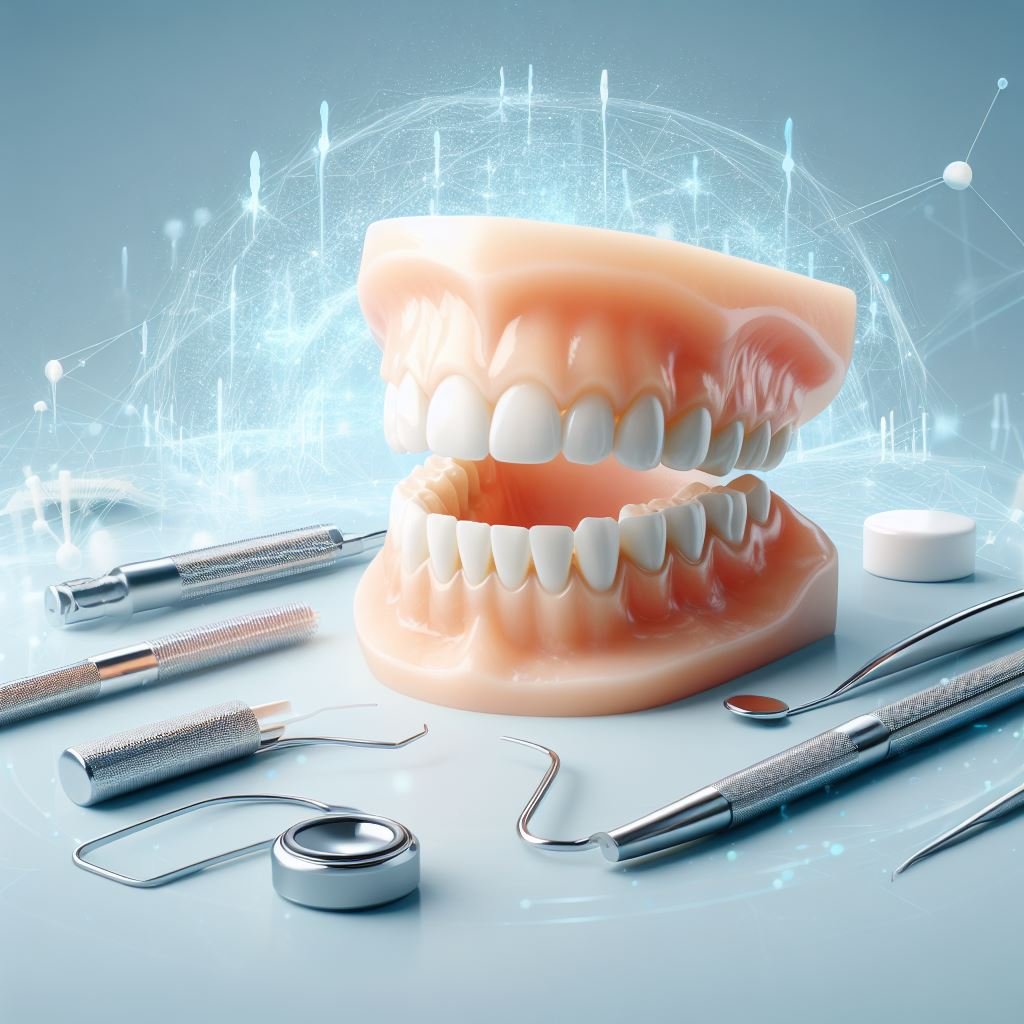Dentures, whether full or partial, provide many individuals with the confidence to smile, eat, and speak without hesitation. But just like natural teeth, dentures aren't immune to the challenges of plaque accumulation.
As these dental appliances become an integral part of one's daily life, it's paramount to understand how to maintain their cleanliness. By efficiently tackling plaque, not only can you ensure the longevity and appearance of your dentures, but you also promote better oral health.
Quick Answer: How to Remove Plaque From Dentures/Partial Dentures?
For those in a hurry, here's your game plan to combat plaque on dentures:
Daily Brushing: Just as with natural teeth, dentures benefit from daily brushing. Use a soft-bristled brush and avoid regular toothpaste which may be too abrasive.
Specialized Cleaners: Invest in cleansers specifically designed for dentures. They're formulated to break down plaque without harming the denture material.
Professional Cleanings: Schedule regular appointments with your dental professional to evaluate the soft tissues of your mouth (gums, tongue, etc.) and also give your dentures a thorough cleaning, ensuring they remain in top-notch condition.
Stick around for a more detailed guide on each of these steps!
Plaque on Dentures: Quick Background Info
Plaque is a sticky film of bacteria that constantly forms on our teeth and gums. This biofilm thrives on food particles, especially sugars and starches, leading to a buildup that can harden into tartar if not removed promptly.
Dentures, being in the mouth for up to 16 hours daily, aren't spared from this bacterial assault.
While natural teeth have a complex structure and are rooted in the gums, dentures are artificial replacements made from materials like acrylic. These materials, while designed to mimic the appearance and function of natural teeth, don't have the same porous nature. However, they still offer a surface for plaque to adhere, especially in the hard-to-clean surfaces such as the grooves of the teeth and the areas between denture teeth.
The difference between plaque on natural teeth and dentures is primarily the material they cling to. Plaque can cause discoloration, bad breath, and even gum irritation for denture wearers. While natural teeth may face cavities and gum diseases due to plaque, dentures might lose their fit or become uncomfortable to wear.
Daily Maintenance for Denture Hygiene
Maintaining denture hygiene is a daily affair. Here's how to keep your dental appliance in its best shape:
1. Daily Brushing:
Tools: Opt for a soft-bristled brush specifically designed for dentures. Regular toothbrushes or those with hard bristles can cause scratches.
Techniques: Gently brush all the surfaces of the denture, paying particular attention to areas that touch the gums or any metal clasps. Don’t use toothpaste — choose warm water or denture cleanser, instead. Ensure you rinse the denture thoroughly after brushing.
Precautions: Avoid using regular toothpaste or abrasive cleaners as they might cause tiny scratches where bacteria and stains can build up.
2. Nightly Denture Soaks: Before bedtime, it's a good idea to let your dentures take a nightly plunge. Soaking them in a denture solution not only helps in keeping them clean but also maintains their shape by preventing them from drying out.
3. Choosing the Right Denture Cleanser: There's a myriad of denture cleansers available in the market, from effervescent tablets to creams. When selecting, ensure that the product carries the American Dental Association (ADA) seal of acceptance, signifying its safety and efficacy. Also, always follow the manufacturer's instructions for the best results. Avoid using hot water with these cleansers, as it might warp your dentures.
Deep Cleaning Methods for Stubborn Plaque
While daily maintenance plays a significant role in keeping your dentures plaque-free, there are times when a more intensive cleaning approach is required.
1. Commercial Denture Cleaning Solutions: Numerous over-the-counter solutions are formulated to combat stubborn plaque and stains. They typically come as effervescent tablets that, when dropped into water, produce a fizzy solution that helps dislodge plaque and food particles. These solutions often contain mild abrasives and disinfectants to ensure a thorough cleaning.
2. DIY Methods:
Baking Soda Soaks: A natural cleanser and deodorizer, baking soda can be an effective solution for denture cleaning. Dissolve two tablespoons of baking soda in a glass of warm water and soak your dentures overnight.
Vinegar Solutions: Especially effective for tackling tartar buildup, a half vinegar, half water solution can be a potent soak for dentures. However, ensure to rinse your dentures thoroughly afterward to remove any lingering vinegar taste.
3. Ultrasonic Cleaners: These devices are a modern solution for deep cleaning. They work by sending high-frequency sound waves through a water solution where the dentures are soaked. These sound waves produce microscopic bubbles that dislodge plaque and debris from areas that might be hard to reach with a brush. If you're considering an ultrasonic cleaner, ensure it's specifically designed for dentures to avoid any damage. Better yet, maintain yearly checkups with your dentist, who will have a professional-grade ultrasonic cleaner available for use.
Tips to Minimize Plaque Buildup
Beyond the cleaning, a proactive approach to denture care can help minimize the hassle of plaque buildup.
1. Proper Storage of Dentures: Always store your dentures in a clean, designated container with a lid. This prevents them from drying out, which can make them more susceptible to plaque and bacteria. Ensure the storage solution, whether it's water or a specialized solution, is changed daily. Avoid leaving the lid open, which will allow for the entry and buildup of bacteria.
2. Diet and Hydration's Role in Plaque Accumulation: A balanced diet not only benefits your overall health but also your oral hygiene. Crunchy fruits and vegetables can naturally help clean dentures. Staying hydrated aids in saliva production, which naturally cleans the mouth and reduces the chance of plaque formation.
3. Regular Rinsing After Meals: Make it a habit to rinse your dentures after every meal. This simple act can go a long way in preventing food particles from settling and eventually forming plaque. Use lukewarm water to avoid any potential warping of your dentures.
When to Seek Professional Cleaning
Even with meticulous care, there might be times when you notice stubborn deposits on your dentures that refuse to budge. In such instances, it's wise to turn to professionals.
1. Identifying Stubborn Deposits: Over time, dentures can accumulate hard-to-remove tartar, just like natural teeth. If you observe any white or yellowish build-up that doesn't go away with regular cleaning, it might be time for a professional touch. Using instruments like dental scalers at home might be effective in removing this tartar, but it is also a high-risk activity for damaging the denture or knocking teeth out of the denture.
2. The Benefits of Professional Denture Cleaning: Dental professionals use specialized tools and techniques to clean dentures effectively. This not only ensures the removal of any stubborn deposits but also checks for any wear and tear, ensuring your dentures function optimally.
3. How Often Should You Get Professional Cleanings? While daily maintenance is essential, consider seeing a dental professional for denture cleaning at least once a year. They can provide a thorough cleaning, check for any fit issues, and offer tips for home care. Even if you decline once-yearly dental visits, be sure to get a checkup every few years — your dentist will do a “soft tissue check” that could identify lesions (such as oral cancer) before they turn hazardous.
What NOT to Do When Cleaning Plaque from Dentures
1. Avoid Abrasive Toothpaste: Traditional toothpaste designed for natural teeth can be too abrasive for dentures and may cause tiny scratches where bacteria and plaque can build up.
2. Don't Use Boiling Water: Boiling or excessively hot water can warp your dentures, altering their fit.
3. Steer Clear of Bleach: Using bleach to whiten dentures can weaken them and change their color. Moreover, bleach can irritate the soft tissues of your mouth.
4. Avoid Sharp Instruments: Trying to remove hard deposits or scrape off plaque with sharp objects can damage your dentures.
5. Never Leave Dentures Dry: When not in use, always store dentures in water or a denture solution. Allowing them to dry out can cause them to lose their shape.
Final Thoughts
Denture hygiene goes beyond cosmetics. Clean dentures contribute to oral health, ensuring you stay free from infections and enjoy your meals without discomfort.
By incorporating a routine cleaning regimen, you not only prolong the life of your dentures but also ensure a radiant smile and overall well-being. Remember, just like natural teeth, your dentures deserve attention and care.
FAQs
Can I use regular toothpaste on my dentures?
No, it's best to use a non-abrasive denture cleaner. Regular toothpaste can cause microscopic scratches that harbor bacteria. Additionally, this abrasion will cause the dentures to wear down and need replacement more frequently.
How often should I replace my denture brush?
Replace your denture brush as often as you would a regular toothbrush, typically every 3-4 months, or sooner if the bristles look worn out.
Is it okay to sleep with my dentures in?
While some people prefer sleeping with their dentures, it's advisable to give your gums some rest and soak the dentures overnight for cleanliness. Sleeping with your dentures can cause severe irritation to the gums, and is also a leading cause of fungal infections of the mouth.
Do ultrasonic cleaners replace brushing?
No, ultrasonic cleaners can help with deep cleaning, but daily brushing is essential to remove food particles and prevent plaque buildup.
Can I use vinegar to clean my dentures every day?
While vinegar is a popular DIY cleaning method, daily use can stain or even erode the denture material. Limit its use to once a week or opt for commercial cleaners specifically designed for dentures.
* Though the author of this post is a licensed dentist in the state of Kansas, this information is provided for informational and educational purposes only. Please use your best judgment and contact emergency medical services in the event of an emergency.




